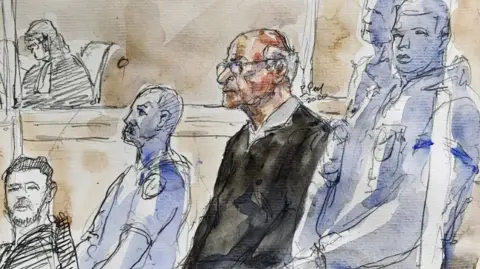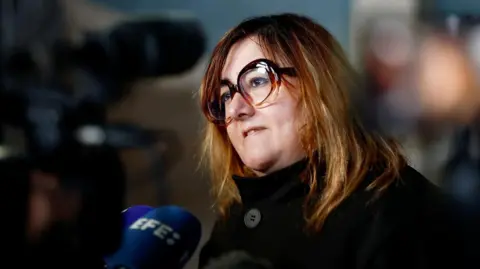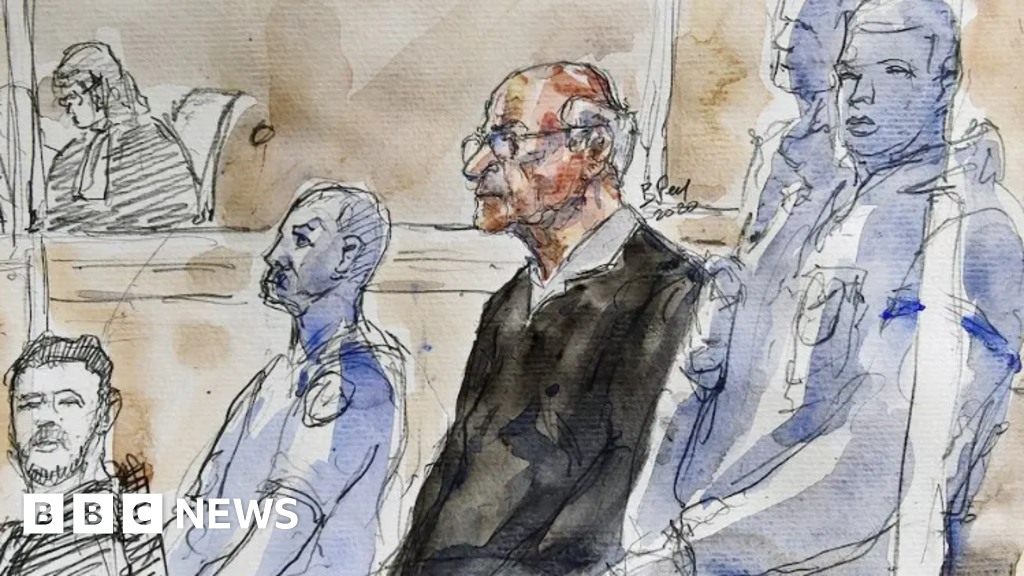 AFP
AFPA French former surgeon accused of abusing hundreds of patients, most of them children, has told a court that he admits to having “committed despicable acts” and “understands and shares the suffering” caused to his alleged victims.
Joel Le Scouarnec is accused of assaulting or raping 299 patients, the vast majority under 15 years old, between 1989 and 2014, mostly in Brittany.
“I am perfectly aware that these wounds are indelible, beyond repair,” Le Scouarnec said, in a halting but clear voice.
The white-haired 74-year-old, who wore glasses and a black zip-up sweater over a grey shirt, was addressing the court in Vannes, north-west France, on the first day of the largest child abuse trial in French history.
Warning: This story contains distressing details
“I can’t go back, but I owe it to [the victims] and their relatives to admit my actions and the consequences they had and that they undoubtedly will continue to have throughout their lives,” Le Scouarnec told the court.
Throughout the day – which was mainly devoted to technical proceedings – he had looked attentive but had no particular reaction when two visibly nervous men in their 30s took the stand to identify themselves as his victims.
The youngest of Le Scouarnec’s alleged victims was aged one and the oldest 70.
Police were able to identify them thanks to meticulously-compiled diaries in which Le Scouarnec is alleged to have logged assaults he carried out on his young patients over more than 25 years.
He has already been imprisoned since 2017 for abusing four children, of which he was found guilty in 2020.
Many of the plaintiffs were allegedly abused while they were under anaesthesia or recovering from surgeries in hospitals across northern France – meaning a number of them had no recollection of the abuse they are said to have sustained, and had to be told by police that their names appeared in Le Scouarnec’s diaries.
“Everything in this terrible story is out of the ordinary… it wasn’t the victims that approached the investigators but the investigators that alerted the victims,” public prosecutor Stéphane Kellenberger said in court.
“Many of them had no memory… several would have rather gone on not knowing. But silence had reigned for too long.”
Many other people, who do remember being allegedly abused, have said the impact of the events has followed them their whole lives, in many cases resulting in serious psychological trauma.
Mauricette Vinet, the grandmother of a patient of Le Scouarnec who committed suicide some years ago, told the BBC her grandson Mathis had been “killed” by Le Scouarnec’s alleged abuse.
“If he hadn’t happened Mathis would still be here,” she said.
Defence lawyer Maxime Tissier told the trial on Monday that Le Scouarnec admitted to the “vast majority” of the charges against him and that his client would soon “explain himself” with regards to the accusations.
“He is a defendant who has made himself entirely available to the court… despite his age,” Mr Tissier said.
Le Scouarmec added in court that during his police examinations he did his best to “admit to the events which constituted rape and those that, in my view, did not”.
 Reuters
ReutersDozens of lawyers were also present in court, but the hundreds of alleged victims they represent were sat in a separate overflow room due to their sheer number. Several psychologists and emotional support dogs will be on hand throughout the course of the trial.
Aude Buresi, the presiding judge, read out a graphic and gruelling summary of the charges against Le Scouarnec, as well as excerpts from his interrogations in 2020, in which the former surgeon initially denied that his diaries reflected real-life abuse and were merely retellings of his “fantasies”.
But Ms Buresi said several elements – including the level of detail and choice of words used by Le Scouarnec – indicated that the diaries were most likely truthful.
In his short statement to the court on Monday, the former surgeon referred to his writings as “very violent”.
An hour before proceedings kicked off a few dozen protesters staged a rally outside the courtroom, carrying letters spelling out the phrase “Stop the code of silence”, while another sign read “Who knew?”
Victims and child advocacy groups have said “systemic failures” allowed Le Scouarnec to continue working with children.
In 2005, the FBI warned the French authorities that he had been accessing child abuse websites, but this just resulted in a suspended sentence and he faced no consequences in the workplace.
Later, when Le Scouarnec was working in the hospital of Quimperlé, he allegedly made sexually-charged comments about a young patient of his, raising the suspicions of a colleague who alerted the regional medical association and made them aware of the suspended sentence.
The members of the association were summoned and all but one doctor – who abstained – voted that Le Scouarnec had not violated the medical code of ethics. The BBC has approached the regional medical association for comment
The association is now pressing charges against Le Scouarnec for “bringing the medical profession into disrepute,” the body’s secretary Didier Robin said on Monday.
His statement elicited a swift rebuttal from lawyer Frédéric Benoist, who represents a child protection advocacy group La Voix de L’Enfant (The Child’s Voice) and has previously told the BBC that Le Scouarnec was able to commit his deeds due to “a huge degree of dysfunction” among medical professionals.
Mr Benoist said it was “morally indecent and legally questionable” that the medical association was allowed to be listed as a plaintiff. “It is unacceptable that [the association] is sat alongside the victims,” he said.
Monday’s session closed early – something that is unlikely to happen again over the course of the trial, which will run on a tight schedule and is due to end in June.
At the request of the plaintiffs, some sessions will be held behind closed doors – but big portions of it will be open to journalists and members of the public.
Le Scouarnec’s ex-wife and his siblings will be heard in court on Tuesday.
Asked why she was attending proceedings that will undoubtedly include sordid and graphic details of abuse, one woman queuing to enter the overflow room told the BBC she wanted to see “this doctor, this Mr Everyman”.
“I want to see what human nature can be capable of, because all of this – it’s just beyond me,” she said.








